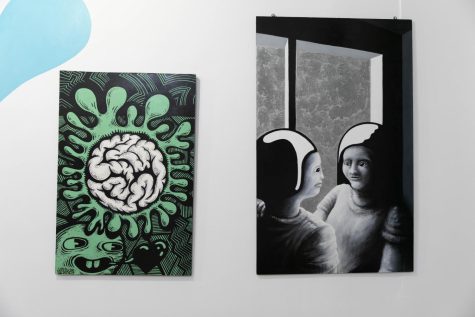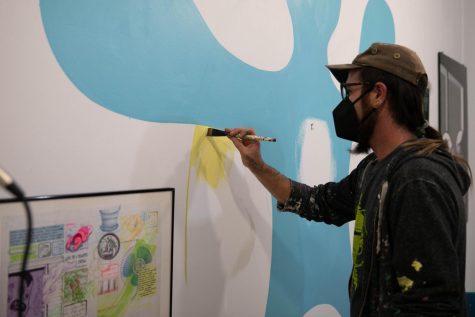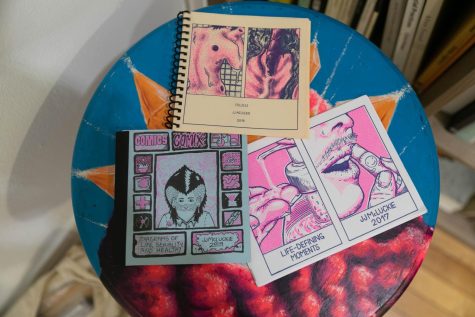Columbia alum and adjunct team up for colorful exhibition exploring ‘madness’ for queer people
October 28, 2022

A bright room covered in artwork with predominantly pastel pink and blue colors is intermixed with sexual images and a cute caterpillar. In the colorful room, a dark painting with black and white imagery of a person looking at themselves in a mirror stands out.
Matt Bodett, an adjunct faculty member in the Art and Art History Department, owns an art studio called Press Here Studio in Chicago’s Fine Arts Building, located at 410 S. Michigan Ave., and uses it to share other people’s work that is unique to their “madness.” On Oct. 15, he held an exhibition of Columbia alum JJ McLuckie’s artwork that explores the mad experience for queer people.
Bodett said he recently started using “madness” to describe his work as a way to reclaim the derogatory meaning toward people with mental illness.
After he was diagnosed with schizoaffective disorder, Bodett found an outlet in art. He said he hates performative art because it is too abstract and inaccessible to the general public who do not have an education in art. Bodett decided to be the change he wanted to see by providing content warnings and holding Q&As at the end of the exhibitions.
“I also get the opportunity to correct people on misunderstandings about mental health, so that when they leave, they’re not just leaving with the wrong ideas, that we can engage in a very kind and reciprocal relationship,” Bodett said.

Bodett expressed he wants to educate people about his perspective through his art and also bring in works from other artists.
“The medical model makes people with mental illness seem like horrible people; we’re monsters, we’re killers, we’re school shooters, we’re the worst people,” Bodett said. “As opposed to my experience, most of the people I ran into were actually very creative, very kind, very compassionate. They were dealing with a lot of s—, but they had much more human qualities than the medical model poses.”
McLuckie met Bodett through their partner Joseph, but they became closer friends only after Joseph died. McLuckie said Joseph dreamed of publishing a book with his poems, and after his death, McLuckie and Bodett collected all the poems for publication.

In their artwork, McLuckie shows explicit sexual poses between masculine figures using pastel colors.
“Growing up as a queer person in a small town, the topic of sexuality was taboo, and if this is taboo then that means part of me is taboo, and that’s kind of gross feeling a lot of times,” McLuckie said. “If I put that at the forefront and balance it out with pastels and plants … it creates a lot less intimidating of a viewpoint.”
McLuckie said working with Bodett was empowering because of how much freedom they had; they could focus more on creating without the wait like in a traditional gallery.
“It’s been very empowering, having the freedom to work with the space, rather than being told how to use the space,” McLuckie said.







